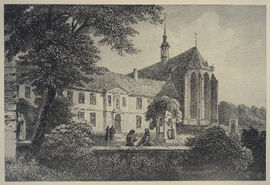Each era is based on the experiences made by other eras. This is also true of the Reformation, which did not arise like a phoenix from the ashes. Already before the Reformation there were people and movements some of whose statements anticipated the ideas of the Reformation. For this reason some of these so-called pre-Reformation movements and people will now be introduced.
1. The New Devotion (Devotio moderna)
In Oktober 1340 in Deventer/Netherlands Geert Grote, the son of a rich merchant, was born. At the age of at least 30 - he had studied a great deal for a long period and had only recently become a canon (a member of the cathedral chapter) in Aix-la-Chapelle - he experienced a conversion. Resulting from this change in his life he wrote several "Decisions and Intentions" for his further life without calling them vows: forgoing income from the Church, reducing his possessions; the main focus being the salvation of his soul. He gives away the largest part of his possessions, becomes a guest in a monastery without himself becoming a monk and he reads many clerical works on the history of the Church. After three years he begins to preach, first of all in the Deventer area then also in other areas of the Netherlands. He preaches penance, calls for prayer and fasting. However, as he stresses, this must not be an outward exercise only but also be sincerely carried out: otherwise it is to no avail. Geert Grote is understood by many. Some begin to lead a communal life outside monastery walls. This model spreads: houses of the "Brethren and the Sisters of the Common Life" emerge in the Netherlands. Even though Geert Grote himself always remained true to the Church he was nevertheless forbidden to preach as a result of his great success; Grote retired and died in 1384.
 For Grote the pivotal point is the search for inner peace,
which results from the denial of one's own self and is to be achieved
by "ardour" and "silence". This is the heart of the
"New Devotion", the "Devotio moderna". And these ideas
took effect. For one among the laity, the "Sisters" or the "Brethren
of the Common Life": many houses are founded in the Netherlands and
in Germany. But also a monastic reform movement takes place at the same
time: followers of Geert Grote found a monastery in Windesheim near Zwolle
in the Netherlands; many other new monasteries (e.g. in Frenswegen near
Nordhorn in Germany) emerge; 100 years after the founding of the first
monastery there are already 97 monasteries which belong to the "Windesheim
Congregation".
For Grote the pivotal point is the search for inner peace,
which results from the denial of one's own self and is to be achieved
by "ardour" and "silence". This is the heart of the
"New Devotion", the "Devotio moderna". And these ideas
took effect. For one among the laity, the "Sisters" or the "Brethren
of the Common Life": many houses are founded in the Netherlands and
in Germany. But also a monastic reform movement takes place at the same
time: followers of Geert Grote found a monastery in Windesheim near Zwolle
in the Netherlands; many other new monasteries (e.g. in Frenswegen near
Nordhorn in Germany) emerge; 100 years after the founding of the first
monastery there are already 97 monasteries which belong to the "Windesheim
Congregation".
Not so much profound theological dispute but the renewal of the practice of living a spiritual life is of central importance in these monasteries. And so doing, the central concern is to immerse oneself in the life of Jesus and to imitate the life of Christ. The most important and extremely influential work documenting this is the "Imitatio Christi", "The Imitation of Christ", which is attributed to Thomas à Kempis who died in 1471. Thomas à Kempis mostly lived in seclusion in St. Agnetenberg Monastery near Zwolle, where he mainly copied books but also wrote some. The "Imitatio Christi" is one of the most widely read books in the world; up to now there are more than 3000 different editions.
The book itself is to be interpreted as a "Diary of a soul on its way to perfection" (E.Iserloh): in many sentences of wisdom the imitation of Christ is to be achieved by renouncing the world and turning to Christ: "Disdain that which is superficial, dedicate yourself to your inner being and you shall see that the Kingdom of God grows inside you." (II,1,1f.) The "Devotio moderna" did not directly prepare the way for the Reformation. Perhaps Luther knew some of its representatives, but this is not certain. However, the Reformation did assimilate and remould this widespread reform movement, just as it also did, for example, with Humanism. During the Reformation the protest against all exterior piety becomes even more fundamental and the point is also that it is theologically specified. But the ground for a theological reform is certainly also prepared by the Devotio moderna. The fact that later on so many clergymen allowed themselves to be convinced by the message of the Reformation in Germany and the Netherlands makes the "Devotio moderna" a pre-Reformation movement.